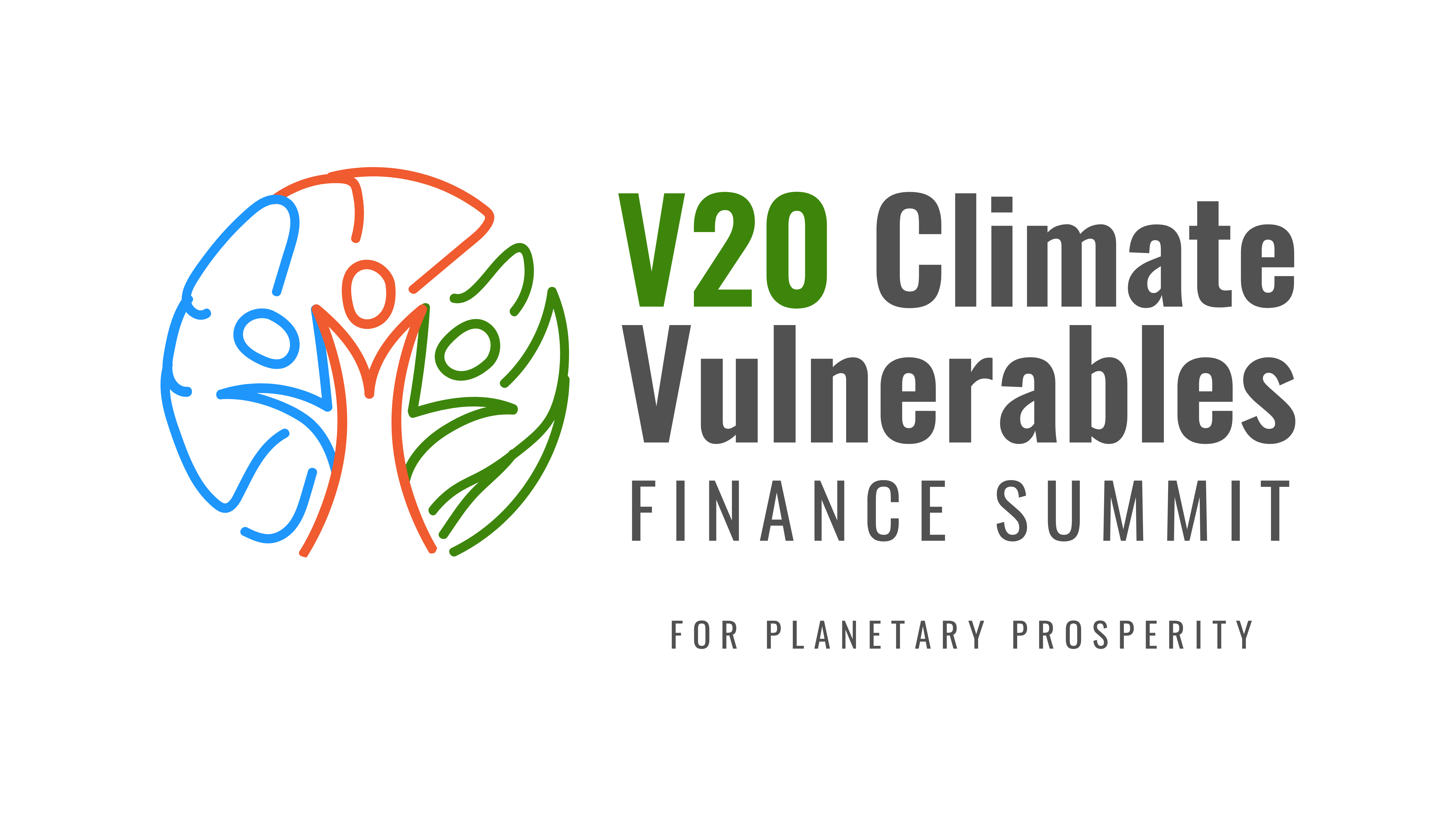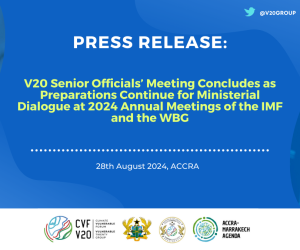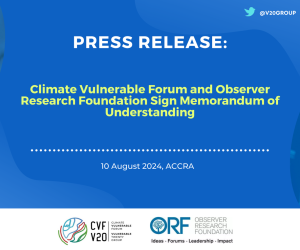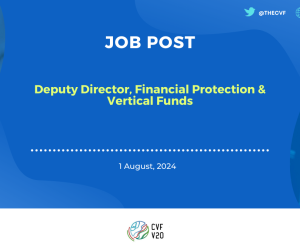1st Climate Vulnerable’s Finance Summit Communiqué
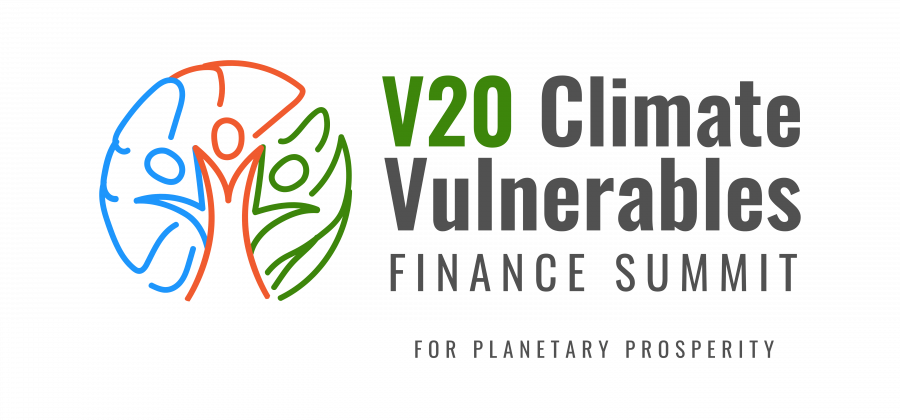
1ST CLIMATE VULNERABLE’S FINANCE SUMMIT
COMMUNIQUÉ
8 July 2021 – Convening of the V20 Ministerial Dialogue VII
We, Ministers of Finance of Vulnerable Twenty Group (V20), joined by a number of our leaders, met in a virtual format for a First Climate Vulnerable’s Finance Summit as economies systemically vulnerable to climate change grappling with crises on two fronts: climate and the COVID-19 pandemic. We shared determination to fight for our futures, our survival, and our prosperity, and to secure a just, resilient, and green recovery from the COVID- 19 pandemic by acting as a driving force of economic and financial solutions. We agreed on our challenges, our top priorities, our joint vision, and plans for action, as well as our expectations from the international community, as follows:
OUR CHALLENGES
- The point of no return is here: We welcomed the recent commitments to enhanced climate action by G7 and G20 members. However, we are concerned that less than half of all nations, and particularly the major carbon emitting nations, failed to increase the ambition of their nationally determined contributions (NDCs) under the Paris Agreement for the once-in-five-year mandated deadline, even despite our appeals to the international community under this forum’s ‘Midnight Survival Deadline for the Climate’ initiative. Global emission cuts must be close to double their current level by 2030 to limit global warming at 1.5° Celsius as committed in Paris in 2015. Beyond that level, warming is incompatible with our survival as nations or the economic viability of our homelands and our key systems of development. Such drastic planetary warming would wreck ours and the world economy, leaving no one, however rich, untouched. 2030 is tomorrow. We are not nearing the point of no return; we have arrived at it. The shocks of the pandemic have further compounded climate vulnerabilities and demonstrate that the urgency and justification for action has never been greater. All countries who failed to raise ambition according to the mandated Paris timeframes and still maintain the same national climate targets as they did in 2015, despite over half a decade of technological developments and the increased affordability of renewables, must urgently come forward with upgraded ambition, and do so well prior to COP26, for the sake of the survival of the most vulnerable.
- The most vulnerable suffer climate finance failure most: We appreciate the recognition by the G7 in its Carbis Bay Summit Communique that developed countries must increase international public climate finance contributions, particularly towards adaptation. This is required in order to realize the regrettably unfulfilled collective obligations by developed countries at the UN to jointly provide $100 billion per year in new and additional, and balanced finance, as of 2020, and must be made up with a joint ‘Delivery Plan’ for 2020-2024. We also welcome the renewed commitment of each G7 member to increase its international public climate finance contributions this year while prioritizing improved accessibility and predictability of finance flows. In addition to the failures of major economies to reduce their climate pollution, such shortcomings in international climate financing directly inhibit the level of action we can take, compounding the exposure of our most vulnerable, least responsible economies to far more costly annual levels of loss and damage than any amount of finance received or promised from significantly carbon emitting nations. As least developed, small island, emerging, and landlocked developing economies, such failures undermine our efforts to transition to a resilient, carbon-neutral future, particularly amid the economic shocks of the global COVID-19 pandemic. Recognizing carbon trading mechanisms of the Paris Agreement and the inability to operationalize Paris Agreement carbon mechanisms for over half a decade has, in addition, obstructed further avenues of economic cooperation and support for our sustainable development efforts and green growth and green job prospects.
- We lack finance adapted to the challenges we face: We cannot easily fund projects to adapt to the ‘new normal’ because these require far more up-front capital because of today’s new climate and weather extremes. The same is true for renewable energy projects which also have high upfront costs but are the more cost-effective over a decade, compared to fossil power lock-in which includes inflationary and volatile fuel costs passed onto the public. This is a serious problem given the obvious need for economy- wide transformation and our own average cost of capital being far higher than more advanced economies. High capital costs affect the commercial viability and bankability of most projects, discouraging the private sector away from climate action. The high capital costs in the climate vulnerable countries are already estimated to be 10% greater because of the disproportionate climate risks we face, which are likely to worsen rapidly. The situation must not be intensified by unfair treatment of climate risks by financing institutions (FIs) to the detriment of hard-hit frontline economies while not sufficiently holding accountable investors that are responsible for climate pollution. Since V20 lack of access to financial protection against climate disasters triggered by high costs is at 98%, as it stands, our enterprises and our communities cannot access viable and affordable insurance products from the market. Besides, when disasters strike, our extreme resource constraints, capacity gaps, narrow fiscal space, and high level of indebtedness are used to pass us over for access to international financial support. Similar unfair access also makes it harder for us to finance our green and nature-based aspirations. To our dismay, bilateral and multilateral concessional lending and foreign investment addressing climate needs falls far short of our demands.
OUR VISION
Despite such challenges, we believe that a clear pathway through the crisis of climate change, compounded by the pandemic, indeed demands a just, resilient, and green recovery. Governments and multilateral organizations must seize every opportunity to save the planet while strengthening protection for the most vulnerable communities. We chose to adopt a vision to underpin our efforts, starting with the next five years, and to provide a clear signal to the world economy of where we are headed.
Under this vision, we believe real economic progress, and a strong, resilient, inclusive, and sustainable growth trajectory, can now only be achieved by accelerating efforts that diffuse climate-disruptive risks of all kinds. Furthermore, our priority is to maximize not hinder economic growth, to emerge faster as wealthy nations, and to steadily progress towards the Sustainable Development Goals (SDGs). We can contribute towards that end by effectively integrating climate resilience and low and zero-carbon efforts into our national economic development. Our broader project is aiming at the reversal of our systemic climate vulnerability towards becoming systemically climate-resilient economies. To this end, with our ‘V20 Vision 2025’, we are advancing our drive for prosperity, while maintaining harmony with the Earth’s climate and for the utmost benefit of the most vulnerable. This, our 7-point vision, thereby specifically aims to:
-
- (1) Leverage Trillions of New Investments
- (2) Overcome Capital Cost Challenges
- (3) Close the Financial Protection Gap
- (4) Boost Job Growth
- (5) Secure a Just Transition & Protect Workers
- (6) Optimize Public Finance and Fiscal Practices
- (7) Leverage Renewable Energy Wealth and Energy Efficiency for Economic Gains.
- (1) Leverage Trillions of New Investments
WAY FORWARD
To realize this V20 Vision by 2025, we are acting with urgency by innovating, pioneering, exchanging, and laying the foundations for the future, including by prioritizing the following key actions:
- Climate Prosperity Plans: We launch new a ‘climate prosperity’ program for the development and implementation of the strategic economic-climate-SDG investment and cooperation frameworks to advance V20 ambitions for resilience and prosperity across our economies, commencing with Bangladesh’s ‘Mujib Climate Prosperity Plan’ in honor of the centenary year of Bangladesh’s Father of the Nation, Bangabandhu Sheikh Mujibur Rahman. Through these plans, we will work to catalyze the economic transformation of our member economies to launch a decade and more of progress propelled by fast-tracked action. Our goal is to improve our key socio-economic growth outcomes – national and disposable income, poverty reduction, investment, jobs, economic stability, trade balance, and other critical socio-economic results – by optimizing core economic and climate responses together. Our plans will form a V20 contribution to vital change in systems of the global economy. Through economic cooperation, the realization of prosperity plans could represent significant opportunities for investment and trade, technology transfer, and manufacturing partnerships. We strongly believe that the V20’s potential, as growth engines for the world economy, will be sustainable through our joint efforts.
- Key V20 Initiatives:
-
-
- V20 Climate Prosperity Recovery Agenda: Together with the involvement of partners, we aim to ensure systematic consideration of climate risk and, in parallel, explore special financial support options (including but not limited to additional Special Drawing Rights allocations to overcome significant liquidity shortfalls) for climate frontline economies, including capacity development and crisis assistance, among other items.
- Accelerated Financing Mechanism: An innovative financing mechanism to bring down the cost of capital across the capital stack by directly unlocking at least $30 billion of private sector investments. This can be done through more systematic and optimized financial de-risking for resilient infrastructure and renewable energy, working through Multilateral Development Banks (MDBs) and national Financial Institutions (Fis).
- Sustainable Insurance Facility: Now hosted in the UN Environment FI Principles for Sustainable Insurance Initiative, and supported by the Munich Climate Insurance Initiative, the Facility provides climate-smart insurance for micro, small and medium-sized enterprises (MSMEs) and the vulnerable people that depend on them. he Facility aims to build local and regional insurance markets to help better absorb risk, develop resilient business models, and free up public and private resources for investment in the resilience and growth of our economies and people. Asia- Pacific implementation is already advancing supported by the Asian Development Bank’s ACliFF.
-
- V20 Work: We furthermore approved a comprehensive plan of work across our three focus groups and our joint technical committee on financing initiatives with the Climate Vulnerable Forum (CVF). In the Advocacy and Partnerships focus group, we will work to articulate the interests and needs of member economies and mobilize and foster robust partnerships with governments, international organizations, and the private sector. We will aim to further engage in dialogue and cooperation with the G7 and G20– cooperation which forged the InsuResilience Global Partnership, co-led by the V20 and G20+ members, that works to close the financial protection gap for climate and disaster risks for 500 million people in vulnerable developing countries by 2025. We also formed a research Task Force on Climate Policy for Development at the IMF with G24 and V20 in order to contribute to the development of IMF policies to promote financial stability for growth and development in response to the fast-accelerating climate crisis. We have, moreover, just established a dedicated, new UN-managed CVF & V20 Joint Multi-Donor Fund managed by the UN to support our efforts. In 2019, V20 and CVF named the Global Center on Adaptation as its Managing Partner and host of our forum’s ad hoc secretariat. In the Climate Accounting focus group, we are taking steps and building capacity to optimize fiscal and public finance practices for climate action and pursue our carbon pricing aspirations. In the Risk focus group, we are working to mobilize reliable support for disaster risk finance and insurance including smart premium subsidies and capitalization support for micro, meso- and macro-level instruments and an inclusive and transparent global structure to administer such support.
OUR EXPECTATIONS
No single country or economy can unilaterally prevail in the climate crisis or COVID-19 pandemic. Our expectations for contributions from the international community encompass:
- Balanced annual $100 billion Delivery Plan 2020-24: Developed countries that have failed their contributions to closing the finance gap to ensure the $100 billion per year support must take urgent steps to fulfil their part of this UN-agreed collective funding promise, and well prior to COP26, for the sake of international climate action and cooperation. We are specifically demanding a joint ‘Delivery Plan’ from the developed nations to concretely demonstrate how the $100 billion in annual climate finance will be met over the 5 years’ period from 2020 to 2024 with in total a minimum of $500 billion of climate finance provided. This Delivery Plan should also stipulate how the promised 50:50 balance between adaptation and mitigation in the unmet annual $100 billion climate finance commitment will be achieved with all developed countries allocating more public and grant-based funds for adaptation, which has a lower leveraging capacity of private finance than mitigation. Individual developed countries must indicate how and when they will catch up to align their public contributions with the balance by allocating public international climate finance to scale up to at least 50% resources for adaptation. We urge the IMF and other FIs to jointly assess gaps and failures in international finance and to propose practical solutions, taking into consideration debt sustainability. Synergies between existing funds and streamlined direct access by countries must be prioritized.
- North-South, South-South & Triangular Cooperation: The V20 member countries emphasize North- South Cooperation for unlocking the potential relating to innovative financing model, transfer of green technology, and necessary capacity building.Moreover, these countries will strengthen internal economic cooperation between the members, and welcome strengthened South-South Cooperation for developing countries to seize the opportunity of working together, and Triangular Cooperation incorporating the developed countries.
- Robust carbon markets: COP26’s finalization of all key arrangements to operationalize the Paris Agreement’s international carbon market mechanism to boost global cooperation with an outcome robust enough to safeguard the 1.5° C limit, while generating proceeds of at least 5% for the adaptation efforts of particularly vulnerable developing countries and the equitable sharing of benefits between host countries and buyers. Establishment of regional or national carbon financing hubs to coordinate and access international carbon finance to support national development objectives. Explore domestic and/or regional carbon pricing mechanisms in-line with previous V20 decisions.
- Financing for loss and damage: It is important to support vulnerable groups that are experiencing increasingly serious economic and non-economic loss and damage due to inadequate emission reduction measures and international finance and related implementation support frameworks. Upscaled action to avert, minimize and address impacts and loss and damage requires finance and dedicated financing mechanisms and necessary allocations, which are urgently called for.
- Recovery agenda: The need for a fit-for-purpose initiative of Bretton Woods system to tackle the global market failure of the climate crisis, while adding vitality to a just and sustainable recovery including to deliver on the promise of a new, resilient economy, such as through the proposed V20 Climate Prosperity Recovery Agenda that we call on the IMF to support, especially with the upcoming special drawing rights allocation for the poorest and most climate vulnerable countries to be given greater allocations.
- Debt support and flexibility: Debt support, including debt forgiveness and suppression for highly- indebted climate vulnerable economies facing imminent liquidity crises, as well as Debt for Climate (DFC) swaps for interested middle-and-low-income vulnerable economies where new climate ambition and investments are restricted because of limited fiscal space. More flexibility on debt is required to enable V20 countries to finance climate action.
- Cost of capital support: Dedicated support in the form of guarantees and other assistance targeted at reducing the cost of capital to unlock the true power of the private sector to enable bold climate change action, especially through the V20-led Accelerated Financing Mechanism is important. Equally important is the availability of a menu of financial tools to suit our contexts including access to market-based instruments such as bonds (blue, green, resilience), blended finance, debt instruments, capital market tool, among others, and the support of such instruments by the international finance community.
- Financial protection gap: It is necessary to close the 98% financial protection gap against climate and disaster risks through (i) the systematic provision of smart premium subsidies and capitalization, (ii) a global public-private partnership for risk analytics and resilience, (iii) mobilization through the V20-led Sustainable Insurance Facility as part of the G20+ and V20-led InsuResilience Global Partnership (IGP) towards developing domestic and regional insurance markets for climate risks, and (iv) ensuring gender-smart and socially inclusive solutions.
CONCLUSION
The failure to deliver climate finance does not have to be permanent. Despite the high degree of uncertainty and the great and growing need for more predictability, the ultimate equation remains unchanged: risks and the opportunities arising from the climate crisis will continue to be determined by where and how financial resources are mobilized, monitored, exchanged, and invested. The sooner the shortcomings of international economic and financial cooperation on climate change are corrected, the faster the mutual benefits of more effective global collaboration emerge to the advantage of all human beings on earth. The V20 encourages partners to support our ‘climate resilient recovery for sustainable prosperity’ initiatives through a triple dividend response to achieve durable gains that reduce pandemic risks at the same time as increasing climate action and resilience and strengthening economic recovery and growth.
On this day our Ministerial Dialogue resolved to endorse the V20 Work Plan and continue implementation and strengthening partnerships for global and regional progress underpinned by the V20 Vision 2025, the new Climate Prosperity Program and the V20 Climate Prosperity Recovery Agenda. We look forward to the continued scaling and operationalization of our Accelerated Financing Mechanism, Sustainable Insurance Facility and CVF & V20 Joint Multi-Donor Fund.
Adopted by the Vulnerable Twenty Group of Ministers of Finance
8 July 2021


